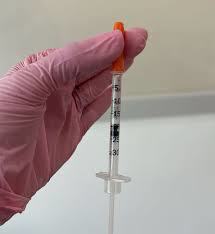
At Tulsi Wellness Club, we understand that starting a new medication can come with unexpected side effects. Tirzepatide, a revolutionary weight loss and diabetes management medication, has helped thousands of people shed excess weight and regulate blood sugar. However, like many GLP-1 receptor agonists, Tirzepatide can cause gastrointestinal side effects, with diarrhea being one of the most common.
If you’ve experienced diarrhea while taking Tirzepatide, you’re not alone. In this article, we’ll explore why Tirzepatide can cause diarrhea, how to manage it, and ways to prevent it while still reaping the benefits of this powerful medication.
Why Does Tirzepatide Cause Diarrhea?
Tirzepatide is a dual GLP-1 and GIP receptor agonist, meaning it mimics two important gut hormones:
GLP-1 (Glucagon-Like Peptide-1) – Regulates appetite, slows digestion, and reduces blood sugar.
GIP (Glucose-Dependent Insulinotropic Polypeptide) – Enhances insulin sensitivity and fat metabolism.
While these effects contribute to weight loss and blood sugar control, they can also disrupt normal digestion, leading to diarrhea. The main reasons for this include:
Slowed Gastric Emptying
Tirzepatide slows down how quickly food moves through the stomach. While this helps with feeling full longer, it can also lead to digestive discomfort and unpredictable bowel movements, including diarrhea.
Changes in Gut Microbiome
Tirzepatide influences the balance of gut bacteria, which can sometimes trigger temporary digestive issues, including loose stools and increased bowel movements.
Increased Fat Excretion
Since Tirzepatide improves fat metabolism, the body may excrete undigested fats more rapidly, leading to looser stools.
Increased Fluid Secretion in the Intestines
GLP-1 receptor activation can increase fluid movement into the intestines, which may cause watery stools and diarrhea in some individuals.
How Long Does Tirzepatide Diarrhea Last?
For most individuals, diarrhea is mild to moderate and improves within a few days to a few weeks as the body adjusts to the medication. However, in some cases, it may persist, requiring dose adjustments or dietary modifications.
How to Manage and Reduce Tirzepatide-Induced Diarrhea
While diarrhea can be inconvenient, there are several ways to minimize discomfort and maintain digestive balance while taking Tirzepatide.
Adjust Your Diet
Eat smaller, more frequent meals – Large meals can overwhelm the digestive system and worsen symptoms.
Avoid high-fat and greasy foods – These are harder to digest and can trigger diarrhea.
Increase fiber intake gradually – Fiber can help bulk up stools, but too much at once can worsen diarrhea.
Stay hydrated – Diarrhea can cause dehydration, so drink plenty of water and electrolyte-rich fluids.
Start with a Lower Dose
If diarrhea is severe, starting with a lower dose and gradually increasing it may help the body adjust more smoothly. Speak with a healthcare provider to see if dose modification is an option.
Take Probiotics
Tirzepatide can affect the gut microbiome, so taking probiotics may help restore beneficial gut bacteria and improve digestion.
Consider Over-the-Counter Remedies
For short-term relief, anti-diarrheal medications like loperamide (Imodium) may help. However, these should be used only under guidance from a healthcare provider.
Monitor Your Hydration & Electrolytes
Diarrhea can lead to dehydration and electrolyte imbalances. Consider drinking:
Coconut water
Electrolyte drinks (without excess sugar)
Bone broth
When to Seek Medical Attention
While Tirzepatide-induced diarrhea is usually mild, there are some cases where medical attention is necessary. Contact your healthcare provider if you experience:
Severe or persistent diarrhea lasting more than a week
Signs of dehydration – Dizziness, extreme thirst, dark urine, weakness
Blood in stool or black, tarry stools
Severe abdominal pain or cramping
If diarrhea is significantly affecting your quality of life, your doctor may adjust your dosage or explore alternative weight loss treatments.
Final Thoughts: Managing Tirzepatide Diarrhea for Long-Term Success
Tirzepatide is one of the most effective weight loss and metabolic health medications, but gastrointestinal side effects like diarrhea are common in the early stages. Fortunately, these symptoms are temporary and manageable with the right approach.
At Tulsi Wellness Club, we work closely with our clients to personalize their Tirzepatide experience, ensuring that side effects are minimized and results are optimized.
If you’re experiencing diarrhea or other digestive issues while taking Tirzepatide, our wellness experts can help adjust your treatment plan, provide dietary guidance, and offer holistic support.
Book a consultation today to get the most out of your Tirzepatide journey—without the discomfort!
Dr. Natasha MacLeay
Contact Me



